Caryn’s Thoughts
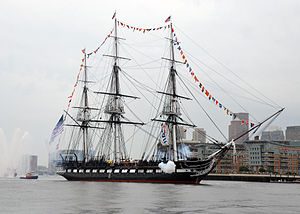 I think most of us have heard of the Barbary Coast at some point. The coast was named for its Berber inhabitants, but it was the trouble that occurred there that has made it a name to remember. The Barbary pirates, who were sometimes called Barbary corsairs or Ottoman corsairs, were pirates and privateers who operated from North Africa, mostly near the ports of Salé, Rabat, Algiers, Tunis, and Tripoli, which is now the area known as the Barbary Coast. In addition to seizing ships, they engaged in Razzias, raids on European coastal towns and villages, mainly in Italy, France, Spain, and Portugal, but also in the British Isles, the Netherlands and as far away as Iceland. Their main goal was to capture Christian slaves for the Ottoman slave trade, as well as the general Arabic market in North Africa and the Middle East. The pirates captured thousands of ships and repeatedly raided coastal towns.
I think most of us have heard of the Barbary Coast at some point. The coast was named for its Berber inhabitants, but it was the trouble that occurred there that has made it a name to remember. The Barbary pirates, who were sometimes called Barbary corsairs or Ottoman corsairs, were pirates and privateers who operated from North Africa, mostly near the ports of Salé, Rabat, Algiers, Tunis, and Tripoli, which is now the area known as the Barbary Coast. In addition to seizing ships, they engaged in Razzias, raids on European coastal towns and villages, mainly in Italy, France, Spain, and Portugal, but also in the British Isles, the Netherlands and as far away as Iceland. Their main goal was to capture Christian slaves for the Ottoman slave trade, as well as the general Arabic market in North Africa and the Middle East. The pirates captured thousands of ships and repeatedly raided coastal towns.
In order to combat the Barbary pirates, the United States Navy built the USS Constitution, which was a 44 gun 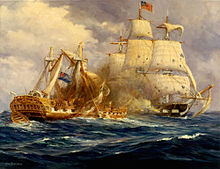 frigate. It was first launched on this day, October 21, 1797, from Boston Harbor. The USS Constitution performed well fighting off pirates in the area, and in 1805, a peace treaty was signed on her deck. When the conflict was over, the ship returned and to its base in Boston. I’m sure the pirates knew full well, that it would return if needed. The ship didn’t have to go back and flex it’s muscle again…at least not there.
frigate. It was first launched on this day, October 21, 1797, from Boston Harbor. The USS Constitution performed well fighting off pirates in the area, and in 1805, a peace treaty was signed on her deck. When the conflict was over, the ship returned and to its base in Boston. I’m sure the pirates knew full well, that it would return if needed. The ship didn’t have to go back and flex it’s muscle again…at least not there.
During the War of 1812, the USS Constitution won its nickname, Old Ironsides, after defeating the British warship, Guerriére in a furious battle off the coast of Nova Scotia. It was said that the British shots just bounced off the sides of the USS Constitution, as if they were made of iron, rather than wood, The Guerriére was thought to be invincible, but that was proven to be a fallacy. On the afternoon of 19 August 1812, about 400 miles southeast of Halifax, Nova Scotia, the Guerriére saw a sail in the distance, bearing down 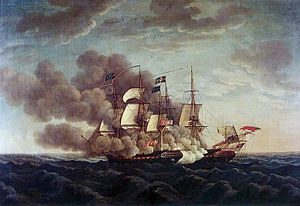 on them. It was the USS Constitution, so the Guerriére prepared for action. Captain James Dacres mustered 244 men and 19 boys, and set them to prepare for battle. When the enemy hoisted American colors, Captain Dacres permitted the Americans in his crew to quit their guns. When the fight was over, nine men were killed and thirteen were wounded. Captain Dacres surrendered his badly damaged ship in an effort to save the lives of the remaining crew, the crew were taken prisoner, and the crew of the USS Constitution set the ship on fire. That was the end of the Guerriére, and Old Ironsides was born. The USS Constitution was retired from service in 1881, and served as a receiving ship until designated a museum ship in 1907.
on them. It was the USS Constitution, so the Guerriére prepared for action. Captain James Dacres mustered 244 men and 19 boys, and set them to prepare for battle. When the enemy hoisted American colors, Captain Dacres permitted the Americans in his crew to quit their guns. When the fight was over, nine men were killed and thirteen were wounded. Captain Dacres surrendered his badly damaged ship in an effort to save the lives of the remaining crew, the crew were taken prisoner, and the crew of the USS Constitution set the ship on fire. That was the end of the Guerriére, and Old Ironsides was born. The USS Constitution was retired from service in 1881, and served as a receiving ship until designated a museum ship in 1907.
 From the time the United States first declared their independence, there was a dispute over the border between the United States and its northern neighbor, Canada. In 1818, the situation finally got to a point whereby a final decision had to be made. It was determined that a convention needed to be held to handle the dispute. The convention, known as the London Convention, Anglo-American Convention of 1818, Convention of 1818, or simply the Treaty of 1818, was to discuss fisheries, boundary and the restoration of slaves between the United States of America and the United Kingdom of Great Britain and Ireland. The Treaty of 1818 was signed during the presidency of James Monroe, and it resolved the boundary between the United States and Canada, then owned by the United Kingdom, once and for all. The treaty allowed for joint occupation and settlement of the Oregon Country, known to the British and in Canadian history as the Columbia District of the Hudson’s Bay Company, and also took in New Caledonia, near Australia.
From the time the United States first declared their independence, there was a dispute over the border between the United States and its northern neighbor, Canada. In 1818, the situation finally got to a point whereby a final decision had to be made. It was determined that a convention needed to be held to handle the dispute. The convention, known as the London Convention, Anglo-American Convention of 1818, Convention of 1818, or simply the Treaty of 1818, was to discuss fisheries, boundary and the restoration of slaves between the United States of America and the United Kingdom of Great Britain and Ireland. The Treaty of 1818 was signed during the presidency of James Monroe, and it resolved the boundary between the United States and Canada, then owned by the United Kingdom, once and for all. The treaty allowed for joint occupation and settlement of the Oregon Country, known to the British and in Canadian history as the Columbia District of the Hudson’s Bay Company, and also took in New Caledonia, near Australia.

It was ultimately decided that the boundary line should be a straight one, because it would be easier to survey. The prior boundaries were based on watersheds, and were difficult to survey. The treaty marked both the United Kingdom’s last permanent major loss of territory in what is now the Continental United States and the United States’ only permanent significant cession of North American territory to a foreign power. Britain ceded all of Rupert’s Land south of the 49th parallel and west to the Rocky Mountains, including all of the Red River Colony south of that latitude, while the United States ceded the northernmost tip of the territory of Louisiana above the 49th parallel.
 Of course, the prior border from the Great Lakes to the east coast, was already established, so it isn’t straight, but the northwestern border is a straight line. I always thought that was odd, and didn’t know why it was that way. I don’t know if I was not paying attention in history class, which was not my favorite subject in my youth, although I don’t really know why it wasn’t, because now I find it quite fascinating. It’s interesting to find out that the northern border was simply a matter of convenience, and a bit of the barter system, if you will. In order to solve the border war, of sorts, Canada (United Kingdom) gave a little, and the United States gave a little. The end result was a clear cut border, and really, peaceful neighbors. I think the was a good way to settle things.
Of course, the prior border from the Great Lakes to the east coast, was already established, so it isn’t straight, but the northwestern border is a straight line. I always thought that was odd, and didn’t know why it was that way. I don’t know if I was not paying attention in history class, which was not my favorite subject in my youth, although I don’t really know why it wasn’t, because now I find it quite fascinating. It’s interesting to find out that the northern border was simply a matter of convenience, and a bit of the barter system, if you will. In order to solve the border war, of sorts, Canada (United Kingdom) gave a little, and the United States gave a little. The end result was a clear cut border, and really, peaceful neighbors. I think the was a good way to settle things.
 My Uncle Jim Richards has lead quite a life. After his dad passed away, when he was just eight years old, Uncle Jim took it upon himself to become the man of the house. In many ways, that decision was the beginning of many years of taking care of other people. Uncle Jim worked hard in school, and the people in his class and even some of the other classes really looked up to him. You could always count on Jim Richards. In fact there were a number of classmates who felt like they owed their life to Jim Richards. One boy, driving drunk, followed Jim home, and that was truly the only way he made it home. Of course, Uncle Jim didn’t know that, because he would have taken the boy home, if he had known. People knew that Uncle Jim was not driving drunk, because he set a standard of behavior at his high school in Bassett, Nebraska. He was also a track star there, having set records in hurdles, and several other sports. Uncle Jim would have made his dad very proud of the man he grew up to be. I don’t know if that thought occurred to him or not, but he would have accomplished that feat anyway. I’m sure that there were many times that Uncle Jim thought of his dad over the years, and what his dad would have done in a situation. I’m sure he did what he thought would make his dad, and his mom proud. Uncle Jim’s dad was a hard working man, working for the railroad for a number of years. I’m sure he instilled that same work ethic in his children. I know that his son Jim worked hard all his life, taking care of family members now and again, and helping out with his grandchildren, while his children worked.
My Uncle Jim Richards has lead quite a life. After his dad passed away, when he was just eight years old, Uncle Jim took it upon himself to become the man of the house. In many ways, that decision was the beginning of many years of taking care of other people. Uncle Jim worked hard in school, and the people in his class and even some of the other classes really looked up to him. You could always count on Jim Richards. In fact there were a number of classmates who felt like they owed their life to Jim Richards. One boy, driving drunk, followed Jim home, and that was truly the only way he made it home. Of course, Uncle Jim didn’t know that, because he would have taken the boy home, if he had known. People knew that Uncle Jim was not driving drunk, because he set a standard of behavior at his high school in Bassett, Nebraska. He was also a track star there, having set records in hurdles, and several other sports. Uncle Jim would have made his dad very proud of the man he grew up to be. I don’t know if that thought occurred to him or not, but he would have accomplished that feat anyway. I’m sure that there were many times that Uncle Jim thought of his dad over the years, and what his dad would have done in a situation. I’m sure he did what he thought would make his dad, and his mom proud. Uncle Jim’s dad was a hard working man, working for the railroad for a number of years. I’m sure he instilled that same work ethic in his children. I know that his son Jim worked hard all his life, taking care of family members now and again, and helping out with his grandchildren, while his children worked.
Times have changed to a degree for Uncle Jim, and for his wife, my Aunt Dixie, because all of their grandchildren are in school all day now, or grown up. They need a lot less care. That can be a lonely time, but always the caregivers, Uncle Jim and Aunt Dixie, do anything that is needed, from picking up the kids at times, to dropping off payments while the kids are at work, and generally just being there for whatever they are needed for. I’m sure that at times, they get weary, at times they feel lonely, and at times they aren’t sure just 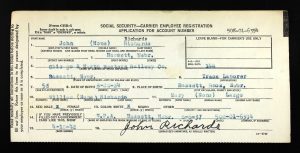 what their role in life is supposed to be. I know this, because in many ways that is how I feel. So much has changed over the years, and the things we were needed for then, we aren’t now. But, that in no way diminishes the value we have as a person. Uncle Jim and Aunt Dixie are as valuable to their family as they ever were, and in fact even more. As our parents grow older, we start to truly understand how precious they are, and that is exactly how Jeannie, Jim, and Raylynn and their families feel about Uncle Jim and Aunt Dixie. They are precious to them. Today is Uncle Jim’s birthday. Happy birthday Uncle Jim!! Have a great day!! We love you!!
what their role in life is supposed to be. I know this, because in many ways that is how I feel. So much has changed over the years, and the things we were needed for then, we aren’t now. But, that in no way diminishes the value we have as a person. Uncle Jim and Aunt Dixie are as valuable to their family as they ever were, and in fact even more. As our parents grow older, we start to truly understand how precious they are, and that is exactly how Jeannie, Jim, and Raylynn and their families feel about Uncle Jim and Aunt Dixie. They are precious to them. Today is Uncle Jim’s birthday. Happy birthday Uncle Jim!! Have a great day!! We love you!!
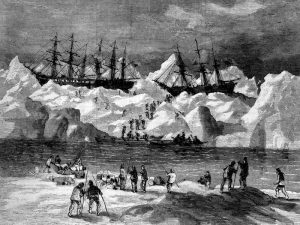 Over the centuries, many ships have been lost at sea, but it isn’t every day that 33 ships are lost together. That was the case in September of 1871, however, when the ice off of the coast of Alaska trapped 33 out of 40 commercial whaling ships who were hunting for bowhead whales in the Artic Ocean. Normally, when ice traps a ship, it eventually releases it’s grip with the shifting winds, but in this case that didn’t happen, and the results were disastrous. Within a few weeks, the ships were destroyed, and the families and crew members had to evacuate and head for one of the ships that was not trapped. As the 1,219 additional people boarded the remaining 7 ships, those ships became overloaded. They had to throw things overboard to allow for the extra weight. Things like their equipment and their precious cargo were lost. The already struggling whaling industry in the United States was basically dealt a final blow. The amazing thing was that no one died, but the loss of 33 ships over those weeks was devastating enough to the whaling industry.
Over the centuries, many ships have been lost at sea, but it isn’t every day that 33 ships are lost together. That was the case in September of 1871, however, when the ice off of the coast of Alaska trapped 33 out of 40 commercial whaling ships who were hunting for bowhead whales in the Artic Ocean. Normally, when ice traps a ship, it eventually releases it’s grip with the shifting winds, but in this case that didn’t happen, and the results were disastrous. Within a few weeks, the ships were destroyed, and the families and crew members had to evacuate and head for one of the ships that was not trapped. As the 1,219 additional people boarded the remaining 7 ships, those ships became overloaded. They had to throw things overboard to allow for the extra weight. Things like their equipment and their precious cargo were lost. The already struggling whaling industry in the United States was basically dealt a final blow. The amazing thing was that no one died, but the loss of 33 ships over those weeks was devastating enough to the whaling industry.
Not much was found of the ships for many years, although debris washed up on shore periodically. Still, no artifacts specifically tied to the shipwrecks could be found beneath beneath the water. In 2015, thanks to technological advances, archaeologists have found the wreckage of what appears to be two of the lost ships. They are located at the bottom of the Chukchi Sea off the coast of Wainwright, Alaska, but an exact location is not being given. Brad Barr, an archaeologist with the National Oceanic and Atmospheric Administration (NOAA), estimated the losses caused by what has been dubbed the Great Whaling Disaster of 1871 would have reached the equivalent of a little more than $33 million today. As Barr told LiveScience: “The event has been attributed as possibly a major contributory factor in the demise of whaling in the U.S.”
Barr began his hunt in late August 2015. He and a team of researchers from the Maritime Heritage Program of the NOAA’s Office of National Marine Sanctuaries surveyed the floor of the Chukchi Sea off the coast of the Inupiat village of Wainwright, in northwestern Alaska. They used state of the art sonar and underwater sensing technologies. They found the magnetic signatures of two shipwrecks they believe are part of the lost 1871 fleet, including the outlines of their flattened hulls. Underwater video revealed anchors, fasteners, pins, and ballast. They even discovered some of the special brick lined pots that the whalers used to heat the whale blubber to turn it into whale oil that was used to fire up oil lamps and make soap, margarine, and other products before the advent of petroleum. While the scientists can’t say definitively that the two wrecked ships were among the 33 lost in 1871, there are a lot of signs that point to it. More than half of all the ships known to have wrecked in the area went down in the 1871 event, and both wrecks, their beams and hull timbers were similar to those used in whaling ships from the late 19th century. The team was also aided in their efforts by changing sea ice levels, increasing opportunities to uncover lost shipwrecks even off Alaska’s northern coast. During the  expedition to the Chukchi Sea, the absence of ice was notable, and the archaeologists reportedly found artifacts from the wrecked ships “just sitting there” for them to find, Barr’s said. The team discovered remnants of a sandbar, which they believe protected the artifacts from sea ice. The NOAA is not really worried that the historic site will be disturbed, because historic preservation laws still apply. Also, there is no gold bullion, jewels or other precious cargo that might draw fortune hunters. Nevertheless, they are not publicizing the site’s exact location. Instead, they will provide all information to the Alaska Office of History and Archaeology, the agency in charge of protecting sites and relics in Alaska.
expedition to the Chukchi Sea, the absence of ice was notable, and the archaeologists reportedly found artifacts from the wrecked ships “just sitting there” for them to find, Barr’s said. The team discovered remnants of a sandbar, which they believe protected the artifacts from sea ice. The NOAA is not really worried that the historic site will be disturbed, because historic preservation laws still apply. Also, there is no gold bullion, jewels or other precious cargo that might draw fortune hunters. Nevertheless, they are not publicizing the site’s exact location. Instead, they will provide all information to the Alaska Office of History and Archaeology, the agency in charge of protecting sites and relics in Alaska.
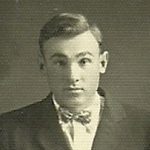 As a young boy of just 15 years, Andy Schulenberg was hunting with a friend, Howard Stewart on an October day in 1921. He leaned his rifle against a tree and it fell over, discharging and hitting Andy in the leg. That event would begin a 2 year long stay in the hospital, and Andy would lose his leg about a year into that stay, in June of 1922. While devastated over this event, Andy dug deep inside himself and decided that he would not be an invalid. Fitted with a wooden leg, that had a simple table like rubberized end to it, Andy proceeded to live the rest of his life. This would not break him, because he was not a quitter. Andy did whatever he wanted to do. Throughout his life, Andy did things his way. He became quite competitive. For a time, his family hauled beets, and Andy could out load anyone when it came to loading the truck. His arms were so strong, by way of compensation for his lack of a leg, and the fact that Andy was a big strong man. Many times while loading those trucks, he could load the truck he was working, faster than two men on the other truck…and then he went over and finished loading their truck too. Nobody could beat Andy Schulenberg!
As a young boy of just 15 years, Andy Schulenberg was hunting with a friend, Howard Stewart on an October day in 1921. He leaned his rifle against a tree and it fell over, discharging and hitting Andy in the leg. That event would begin a 2 year long stay in the hospital, and Andy would lose his leg about a year into that stay, in June of 1922. While devastated over this event, Andy dug deep inside himself and decided that he would not be an invalid. Fitted with a wooden leg, that had a simple table like rubberized end to it, Andy proceeded to live the rest of his life. This would not break him, because he was not a quitter. Andy did whatever he wanted to do. Throughout his life, Andy did things his way. He became quite competitive. For a time, his family hauled beets, and Andy could out load anyone when it came to loading the truck. His arms were so strong, by way of compensation for his lack of a leg, and the fact that Andy was a big strong man. Many times while loading those trucks, he could load the truck he was working, faster than two men on the other truck…and then he went over and finished loading their truck too. Nobody could beat Andy Schulenberg!
In 1955 Andy Schulenberg became the sheriff of Rosebud County, Montana. That was really an amazing feat for a man with a wooden peg for a leg. Andy became a sheriff who didn’t carry a gun. That is such an odd thing to think about. There might be a television show sheriff who didn’t need a gun, but the reality is that a real life sheriff carries a gun…at least any I knew of until Andy Schulenberg. You do have to recall that Andy maybe didn’t just love guns…making his decision to become a lawman a strange one, I suppose. I’m sure that most people must think that Andy lived in an area much like Mayberry on the Andy Griffith Show, but they would be wrong. Andy used different tools in his work as sheriff. He knew a lot of the Indian elders in the area, and they respected him. If Andy was looking for a specific brave, he would go to the elders and ask where he was. They would simply bring the young man to him. There are a number of young men who would be glad to tell you that had it not been for Andy Schulenberg, they would probably have ended up in prison. As I said, Andy was a different kind of sheriff. He believed in second chances, and he earned not only the respect of the elders, but of the young braves, and in fact all the young men and women in the area. He was honest and fair, and they knew they would get a fair shake from him.
There were some comical arrests, however. One in particular was the time Andy was called to Ashland, Montana. Two young Cheyenne Indians had decided to break into a liquor store. They made off with about a case of whiskey. They were down on the brush lined banks of Otter Creek when Andy caught up with them. On the reservation, Andy was known as Cottonwood, because of his wooden leg. When he found the young braves,  they were a little tipsy from the whiskey. They had crossed a log bridge to get to an island to have a little party. Andy cuffed the boys and told them to wait by the car. He went back for the evidence. On his way back, with several bottles of whiskey, Andy slipped and fell into the water. Under normal circumstances that might not have been a big deal, but wood floats, and Andy’s leg was made of wood. As he struggled to get his leg back under him without losing the evidence, the Indian braves sat on the side of the creek bank laughing hysterically. They assumed that the evidence would be lost, and they would get off scot-free, but they were wrong. Andy managed to get his leg under him, and save one bottle of whiskey. Then he took the braves…who had not even considered running, by the way, back to jail. And he did it all without a gun.
they were a little tipsy from the whiskey. They had crossed a log bridge to get to an island to have a little party. Andy cuffed the boys and told them to wait by the car. He went back for the evidence. On his way back, with several bottles of whiskey, Andy slipped and fell into the water. Under normal circumstances that might not have been a big deal, but wood floats, and Andy’s leg was made of wood. As he struggled to get his leg back under him without losing the evidence, the Indian braves sat on the side of the creek bank laughing hysterically. They assumed that the evidence would be lost, and they would get off scot-free, but they were wrong. Andy managed to get his leg under him, and save one bottle of whiskey. Then he took the braves…who had not even considered running, by the way, back to jail. And he did it all without a gun.
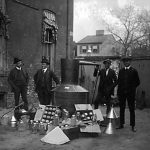
 Many things that used to be illegal, are legal today…things like inter-racial marriage, marijuana (now legal in some states), and booze…believe it or not. Booze went from being legal, to being illegal in 1920, and back to legal in 1933. During those years while it was illegal, as with any law, there were those who broke the law and did it anyway. With booze, the problem, like with marijuana…because it was illegal, was no legal source for it. Enter the Bootlegger. Bootleggers, made their own booze and sold it on the black market of the day. The booze, often called Moonshine, was probably stronger than what booze would have been if it had been regulated and made legally, but an illegal product, is made to different standards, and often contains a much higher concentration than if it were legal.
Many things that used to be illegal, are legal today…things like inter-racial marriage, marijuana (now legal in some states), and booze…believe it or not. Booze went from being legal, to being illegal in 1920, and back to legal in 1933. During those years while it was illegal, as with any law, there were those who broke the law and did it anyway. With booze, the problem, like with marijuana…because it was illegal, was no legal source for it. Enter the Bootlegger. Bootleggers, made their own booze and sold it on the black market of the day. The booze, often called Moonshine, was probably stronger than what booze would have been if it had been regulated and made legally, but an illegal product, is made to different standards, and often contains a much higher concentration than if it were legal.
There have been a number of shows and movies that have almost romanticized bootlegging, but in reality, it was a highly dangerous occupation…if it could be called that. I’m sure there were a few non-violent 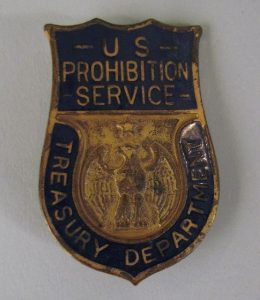 bootleggers…until they had to become violent to protect their stash and their territory. Men like Roger “The Terrible” Touhy, Al Capone, and Roy Olmstead (nicknamed the “King of the Puget Sound Bootleggers”), did everything in their power to bring liquor to those who wanted it…for a price, of course. They had to make a profit and hazard pay was essential too. Early bootleggers smuggled European liquor in, but that quickly became very dangerous, so the bootleggers started to make their own. Every time the prohibition officers caught a bootlegger, the liquor was disposed of…often into the sewer drains. Prohibition officers went everywhere. They were in the cities and the country…anywhere that their intel indicated that a bootlegger had a still in the area. The Temperance Society insisted that they remove every drop of the “demon liquor” from this country. They were convinced that liquor was the root of all evil…so to speak.
bootleggers…until they had to become violent to protect their stash and their territory. Men like Roger “The Terrible” Touhy, Al Capone, and Roy Olmstead (nicknamed the “King of the Puget Sound Bootleggers”), did everything in their power to bring liquor to those who wanted it…for a price, of course. They had to make a profit and hazard pay was essential too. Early bootleggers smuggled European liquor in, but that quickly became very dangerous, so the bootleggers started to make their own. Every time the prohibition officers caught a bootlegger, the liquor was disposed of…often into the sewer drains. Prohibition officers went everywhere. They were in the cities and the country…anywhere that their intel indicated that a bootlegger had a still in the area. The Temperance Society insisted that they remove every drop of the “demon liquor” from this country. They were convinced that liquor was the root of all evil…so to speak.
The bootleggers quickly became Mob leaders with their own gangs, and crossing them quickly became very dangerous. They would even frame or kill their competition, in fact it happened often. Al Capone framed Roger Touhy for kidnapping by his bootlegging rivals with the help of corrupt Chicago officials, was serving a 99-year sentence for a kidnapping he did not commit. He was recaptured a couple of months later. The two men hated each other bitterly, and when it was finally proven that Touhy had been framed, he was released. Three weeks 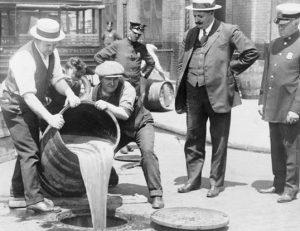
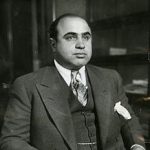 later as he walked into his sister’s house, Touhy was gunned down. Right before he died, he said, “I’ve been expecting it. The b*******s never forget.” No arrests were made. I wonder if anyone really tried. Those were dangerous times, and one gang often retaliated against another. Even after Prohibition was repealed in 1933, bootleggers did not become extinct, because there were still counties and cities who continued Prohibition. Where there is a law, there are lawbreakers.
later as he walked into his sister’s house, Touhy was gunned down. Right before he died, he said, “I’ve been expecting it. The b*******s never forget.” No arrests were made. I wonder if anyone really tried. Those were dangerous times, and one gang often retaliated against another. Even after Prohibition was repealed in 1933, bootleggers did not become extinct, because there were still counties and cities who continued Prohibition. Where there is a law, there are lawbreakers.
 While people might not know that today, October 14 was the day that Air Force test pilot, Chuck Yeager became the first person to break the sound barrier, many do know that it was Chuck Yeager who accomplished that feat. That was back in 1947, and it was an amazing accomplishment in speed flying…an activity common to test pilots, though not always safe or successful, and sometimes deadly. There was also another record that was broken on this day, but this one was back in 2012.
While people might not know that today, October 14 was the day that Air Force test pilot, Chuck Yeager became the first person to break the sound barrier, many do know that it was Chuck Yeager who accomplished that feat. That was back in 1947, and it was an amazing accomplishment in speed flying…an activity common to test pilots, though not always safe or successful, and sometimes deadly. There was also another record that was broken on this day, but this one was back in 2012.
Felix Baumgartner was born in Salzburg, Austria in 1969, and he started skydiving when he was 16 years old. He was also a paratrooper during his time in the Austrian Army. After his time in the Army, Felix decided that he needed that kind of excitement in his life, and so he went on to perform a series of daredevil feats, including becoming the first person to jump from one of the twin 1,483 foot high Petronas Towers in Kuala Lumpur, then the world’s tallest buildings, in 1999, and becoming the first person to skydive across the English Channel using a carbon-fiber wing, in 2003. His next record breaking jump was going to be his greatest feat, however, and it was five years in the making. It also involved a team of engineers, scientists, and aeronautic experts to custom design his equipment, including his pressurized space suit (intended to prevent his blood from boiling at high altitudes) and 6 foot wide, 2,900 pound, pressurized capsule. I’m sure that by now you are wondering why he would need such equipment, but I  assure you that he did. In 2010 the project, which was financed by energy drink company Red Bull, hit a roadblock when Baumgartner started having panic attacks while undergoing endurance tests in his pressurized suit and helmet. A sports psychologist eventually helped him learn to cope with his claustrophobia. I find it amazing that a dare devil would have such a problem as claustrophobia, but remember that he was a sky diver, so he was used to wide open spaces. This project required that he have a capsule that was attached to a helium balloon to take Baumgartner to an incredible height of 24 miles above the Earth.
assure you that he did. In 2010 the project, which was financed by energy drink company Red Bull, hit a roadblock when Baumgartner started having panic attacks while undergoing endurance tests in his pressurized suit and helmet. A sports psychologist eventually helped him learn to cope with his claustrophobia. I find it amazing that a dare devil would have such a problem as claustrophobia, but remember that he was a sky diver, so he was used to wide open spaces. This project required that he have a capsule that was attached to a helium balloon to take Baumgartner to an incredible height of 24 miles above the Earth.
At this point, I’m sure you are curious about the planned jump. On that morning, October 14, 2012, a 550 foot high helium balloon made of 40 acres of ultrathin plastic lifted the capsule carrying Baumgartner, nicknamed Fearless Felix by the crew at the launch site at Roswell International Air Center. He was going to jump from the capsule  at 127,852.4 feet and plunge to Earth. It would be the highest distance anyone had ever skydived from, and it would take nine minutes and eighteen seconds, of which four minutes and twenty seconds would be free fall…without an opened parachute…during which time he fell 119,431 feet. The prior record for high altitude skydiving was held by Joseph Kittinger, who jumped from an altitude of 102,800 feet in 1960. Kittinger was a former Air Force colonel, and was part of the team that helped prepare Baumgartner for his record breaking jump. Baumgartner’s top speed during that free fall was 843.6 miles per hour, or Mach 1.25, making Fearless Felix not only the record holder for the highest skydive, but now he was also the first person to break the sound barrier without the protection or propulsion of a vehicle. The capsule was equipped with cameras, to record the event, which was broadcast on the internet and on television, so it could be witnessed by millions of people world wide. After the jump, Fearless Felix landed safely in the desert near Roswell, New Mexico.
at 127,852.4 feet and plunge to Earth. It would be the highest distance anyone had ever skydived from, and it would take nine minutes and eighteen seconds, of which four minutes and twenty seconds would be free fall…without an opened parachute…during which time he fell 119,431 feet. The prior record for high altitude skydiving was held by Joseph Kittinger, who jumped from an altitude of 102,800 feet in 1960. Kittinger was a former Air Force colonel, and was part of the team that helped prepare Baumgartner for his record breaking jump. Baumgartner’s top speed during that free fall was 843.6 miles per hour, or Mach 1.25, making Fearless Felix not only the record holder for the highest skydive, but now he was also the first person to break the sound barrier without the protection or propulsion of a vehicle. The capsule was equipped with cameras, to record the event, which was broadcast on the internet and on television, so it could be witnessed by millions of people world wide. After the jump, Fearless Felix landed safely in the desert near Roswell, New Mexico.

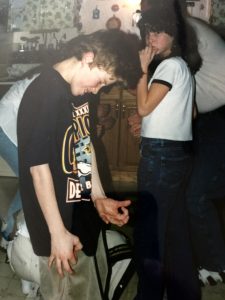 Little boys want nothing more than to be just like their daddies, and my nephew, Ryan Hadlock was no exception. When Ryan was about two years old, he loved to watch his daddy, my brother-in-law, Chris Hadlock play the guitar. To Ryan, playing the guitar was the epitome of his daddy. Ryan almost saw them as one and the same. As we all know, imitation is the sincerest form of flattery, and Ryan wanted nothing more than to imitate his daddy when he was playing the guitar. The only problem was that Ryan didn’t have a guitar, and his daddy’s guitar was too big for him. Enter the imagination of a little boy.
Little boys want nothing more than to be just like their daddies, and my nephew, Ryan Hadlock was no exception. When Ryan was about two years old, he loved to watch his daddy, my brother-in-law, Chris Hadlock play the guitar. To Ryan, playing the guitar was the epitome of his daddy. Ryan almost saw them as one and the same. As we all know, imitation is the sincerest form of flattery, and Ryan wanted nothing more than to imitate his daddy when he was playing the guitar. The only problem was that Ryan didn’t have a guitar, and his daddy’s guitar was too big for him. Enter the imagination of a little boy.
Ryan began to improvise. If it resembled a guitar in Ryan’s mind, he used it like a guitar. Some of his favorite “guitars” 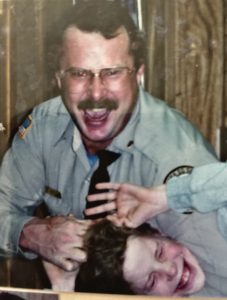 were things like a fly swatter, broom, sticks, and even cardboard. And if nothing was readily available, Ryan would simply play the air guitar. Ryan knew all the moves too. As he played, he would twist himself in all different ways, like a rock star does. Never mind if his sisters though he was just a little bit unhinged! Ryan didn’t care, because they couldn’t possibly understand anyway. It was a guy thing…and something he got to share with his daddy, just them…no girls allowed. You see, being the only boy in a family of four children, meant that Ryan was outnumbered by girls. He needed something that was just for the guys, and it didn’t hurt that he and his daddy loved to play the guitar. Of course, there were also a few other Ryan/Daddy moments too, like horsing around, knuckle rubs, or wrestling matches…the normal daddy/son things. Still, these never really held a candle to playing the guitar, just like his daddy, as far as Ryan was concerned. He has simply loved it all his life.
were things like a fly swatter, broom, sticks, and even cardboard. And if nothing was readily available, Ryan would simply play the air guitar. Ryan knew all the moves too. As he played, he would twist himself in all different ways, like a rock star does. Never mind if his sisters though he was just a little bit unhinged! Ryan didn’t care, because they couldn’t possibly understand anyway. It was a guy thing…and something he got to share with his daddy, just them…no girls allowed. You see, being the only boy in a family of four children, meant that Ryan was outnumbered by girls. He needed something that was just for the guys, and it didn’t hurt that he and his daddy loved to play the guitar. Of course, there were also a few other Ryan/Daddy moments too, like horsing around, knuckle rubs, or wrestling matches…the normal daddy/son things. Still, these never really held a candle to playing the guitar, just like his daddy, as far as Ryan was concerned. He has simply loved it all his life.
When Ryan was about 16 or 17, his parents bought him and electric guitar. He was in 
 Seventh Heaven to have a real guitar of his own. It was like a right of passage. He was now a man…just like his dad was. He was entrusted with a wonderful instrument that was one that a responsible person got to have, and he absolutely treasured it. Recently, his dad gave him a 12 string guitar, and Ryan loves playing that one too. I don’t suppose that he still does all the rock star moves, but then I could be wrong about that. Some things you outgrow, and others you don’t. It doesn’t really matter anyway, because most of us who know him, and especially his family, can still vividly see that sweet little two year old boy playing the flyswatter, the broom, cardboard…or even just the air. Today is Ryan’s birthday. Happy birthday Ryan!! Have a great day!! We love you!!
Seventh Heaven to have a real guitar of his own. It was like a right of passage. He was now a man…just like his dad was. He was entrusted with a wonderful instrument that was one that a responsible person got to have, and he absolutely treasured it. Recently, his dad gave him a 12 string guitar, and Ryan loves playing that one too. I don’t suppose that he still does all the rock star moves, but then I could be wrong about that. Some things you outgrow, and others you don’t. It doesn’t really matter anyway, because most of us who know him, and especially his family, can still vividly see that sweet little two year old boy playing the flyswatter, the broom, cardboard…or even just the air. Today is Ryan’s birthday. Happy birthday Ryan!! Have a great day!! We love you!!
 With a strong family history originating in Germany, for both my family and my husband’s family, German history has always been of interest to me. Most people know that Oktoberfest originated in Germany, but I don’t think that very many really know what Oktoberfest is all about. Everyone knows its all about a German party, and that is true, but why would there be a big party from late September to the first Sunday in October every year?
With a strong family history originating in Germany, for both my family and my husband’s family, German history has always been of interest to me. Most people know that Oktoberfest originated in Germany, but I don’t think that very many really know what Oktoberfest is all about. Everyone knows its all about a German party, and that is true, but why would there be a big party from late September to the first Sunday in October every year?
It all started with a wedding. The Bavarian Crown Prince Ludwig I, who would later become King Ludwig I of Bavaria, married Princess Therese von Sachsen-Hildburghausen. Bavaria would later become a state in Germany. The Bavarian royal family decided to make this a big event, and so they invited the citizens  of Munich to attend the festivities. The festivities were held on the fields in front of the city gates, and in honor of the new crown princess, the fields were renamed Theresienwiese, which means Therese’s fields. That being a really long name, the locals have since abbreviated it to the Wies’n. The celebration was quite grand, and concluded with horse races in the presence of the royal family. The people were so happy with this chosen couple, that the event was one filled with joy and happiness. The wedding was celebrated in varying forms across all of Bavaria. Apparently the festivities were so much fun, that the royal family decided that it needed to be an annual event, including the horse races.
of Munich to attend the festivities. The festivities were held on the fields in front of the city gates, and in honor of the new crown princess, the fields were renamed Theresienwiese, which means Therese’s fields. That being a really long name, the locals have since abbreviated it to the Wies’n. The celebration was quite grand, and concluded with horse races in the presence of the royal family. The people were so happy with this chosen couple, that the event was one filled with joy and happiness. The wedding was celebrated in varying forms across all of Bavaria. Apparently the festivities were so much fun, that the royal family decided that it needed to be an annual event, including the horse races.
The decision to repeat the festivities and the horse races in the subsequent  year gave rise to the tradition of the annual Oktoberfest, which now begins in late September and lasts until the first Sunday in October. Alcohol consumption is an important part of the modern festival, and more than 1 million gallons of beer are consumed annually at Oktoberfest. The royal wedding drew 40,000 people, probably a large amount for the time, but that paled in comparison to the 6.4 million people who celebrated the event in 1997. The horse races were eventually stopped, but held once more in 1811. Many other characteristics of the early Oktoberfest traditions have been retained in Munich to this day. So where did the name come from? Well, it is derived from Theresienwiese…or rather the shortened name, Wies’n which apparently translates…Oktoberfest.
year gave rise to the tradition of the annual Oktoberfest, which now begins in late September and lasts until the first Sunday in October. Alcohol consumption is an important part of the modern festival, and more than 1 million gallons of beer are consumed annually at Oktoberfest. The royal wedding drew 40,000 people, probably a large amount for the time, but that paled in comparison to the 6.4 million people who celebrated the event in 1997. The horse races were eventually stopped, but held once more in 1811. Many other characteristics of the early Oktoberfest traditions have been retained in Munich to this day. So where did the name come from? Well, it is derived from Theresienwiese…or rather the shortened name, Wies’n which apparently translates…Oktoberfest.

 When you think of a town within a town or city, you often think of New York City, where you might find Queens, Harlem, or Yonkers. Or you might think of New Orleans, where you might find the French Quarter or the 9th Ward, but people really never think of a town within a town, when the town is a small town, like Forsyth, Montana, population of about 1,777. Nevertheless, Forsyth, Montana was a town that had within it a town…so to speak. When my husband, Bob Schulenberg’s grandpa, Andrew Schulenberg was a young married man, he built a couple of houses there. The houses were next door to each other. Andy’s parents lived in one house, and he and his wife, lived in the other. Across the street was another house owned by Schulenberg family relative, Bob’s Great Aunt Hennie. Being such a small town, there were other Schulenberg families very nearby, and since Andy’s parents, Max and Julia Schulenberg had ten children, it made for a lot of Schulenberg relation living in a neighborhood in Forsyth, Montana. Well, before long, the people of the town found themselves calling that neighborhood, Schulenbergville. I’m not sure just exactly when
When you think of a town within a town or city, you often think of New York City, where you might find Queens, Harlem, or Yonkers. Or you might think of New Orleans, where you might find the French Quarter or the 9th Ward, but people really never think of a town within a town, when the town is a small town, like Forsyth, Montana, population of about 1,777. Nevertheless, Forsyth, Montana was a town that had within it a town…so to speak. When my husband, Bob Schulenberg’s grandpa, Andrew Schulenberg was a young married man, he built a couple of houses there. The houses were next door to each other. Andy’s parents lived in one house, and he and his wife, lived in the other. Across the street was another house owned by Schulenberg family relative, Bob’s Great Aunt Hennie. Being such a small town, there were other Schulenberg families very nearby, and since Andy’s parents, Max and Julia Schulenberg had ten children, it made for a lot of Schulenberg relation living in a neighborhood in Forsyth, Montana. Well, before long, the people of the town found themselves calling that neighborhood, Schulenbergville. I’m not sure just exactly when 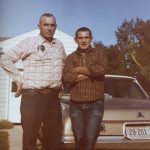 the neighborhood got its name, but since Andy was the sheriff of Rosebud County from 1955 to 1972, my guess is that it was either during that time, or it was his job as sheriff that solidified the name to that area of town.
the neighborhood got its name, but since Andy was the sheriff of Rosebud County from 1955 to 1972, my guess is that it was either during that time, or it was his job as sheriff that solidified the name to that area of town.
I had the chance to see the two houses that Andy Schulenberg built, and to find out that the second one was the house that Bob’s Uncle Butch Schulenberg was born in. I love to see the homes where loved ones were born, partly I suppose, because so few people are born at home these days. In those days, however, being born at home was a very common practice, and it makes me think about the history that the house has witnessed. The house got to see little Butch Schulenberg growing up…or at least starting his life, since I don’t know when the family might have moved out of the house. Nevertheless, the area remained Schulenbergville for a number of years, and I don’t think the locals have forgotten it to this day.
Nor have they forgotten the sheriff who really made the Schulenberg name a household word in the little town of Forsyth. Andy was a different kind of sheriff from those you normally meet, and that is a story I will tell sometime, but it’s too long for this story. Suffice it to say that he was dearly loved, and there is more than one 
 adult who owes the fact that they weren’t in prison…or worse as kids, to Sheriff Andy Schulenberg, and they will be happy to tell you so. The two houses Andy built still stand, as do the houses of the neighboring Schulenberg clan members, although some are no longer occupied. I find that a bit sad, but it is a testament to good construction work. Now they stand as a treasured memory for those who knew Schulenbergville well.
adult who owes the fact that they weren’t in prison…or worse as kids, to Sheriff Andy Schulenberg, and they will be happy to tell you so. The two houses Andy built still stand, as do the houses of the neighboring Schulenberg clan members, although some are no longer occupied. I find that a bit sad, but it is a testament to good construction work. Now they stand as a treasured memory for those who knew Schulenbergville well.

